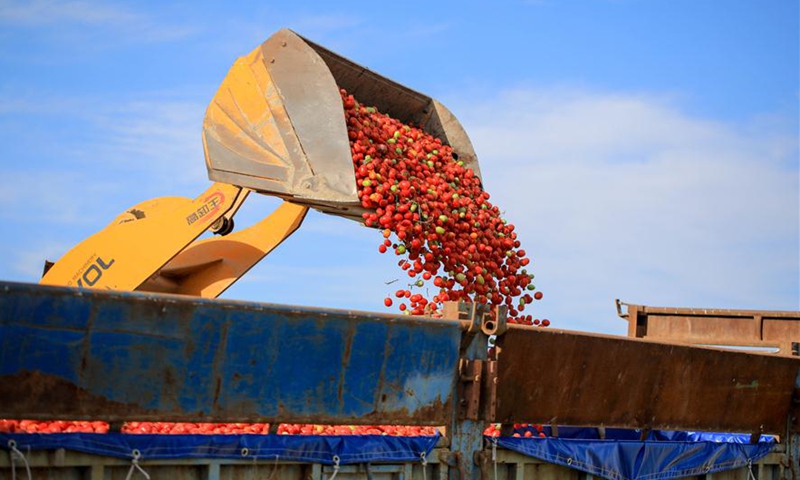
Tomatoes are loaded onto a truck in Bohu County, northwest China's Xinjiang Uygur Autonomous Region, Aug. 5, 2020. Over 1,000 hectares of tomatoes for further processing have entered the mature season in the county at present.Photo:Xinhua
Tomato farmers in Northwest China's Xinjiang Uygur Autonomous Region have shrugged off a hostile move by Japanese firm Kagome, known as Japan's "king of ketchup," which banned tomatoes from the region over widely debunked "forced-labor" claims, in what has been described as a publicity stunt that has no major impact.
With the boycott, Kagome became the first major Japanese company to sever business ties with Xinjiang firms based solely on vicious allegations pushed by some Western anti-China forces.
A Kagome representative claimed that, along with costs and quality, "human rights problems have become a factor in making decision," the Nikkei Asian Review reported on Wednesday.
The move instantly drew backlash in China, where tomato growers forcefully pushed back on those allegations and harshly criticized the decisions, while saying the move will hardly have any major impact.
Zhang Ting, deputy general manager of Shanghai Pusha Investment Development Co, denied that there are human rights issues in the tomato industry in Xinjiang, as claimed by Western media.
His company owns 800 tomato greenhouses in Kashi Prefecture and employs around 800 local workers, Zhang told the Global Times on Thursday.
"The income for local farmers growing tomatoes for ketchup is higher, with most of the processes having been mechanized and automated," he said, noting that all employees including Uyghur ones work eight hours a day.
Zhang stressed that the company produces about 5,000 tons of the crop a year, all of it sold across the country, and therefore the action of the Japanese company poses no threat.
Kagome and Western brands' halt of imports of agricultural products from Xinjiang are a form of downright disinformation and a smear of China's nationwide effort in alleviating poverty in Xinjiang and aiding Xinjiang's development, Sun Wenhua, director of the China Agriculture Industry Chamber of Commerce at All-China Federation of Industry and Commerce, told the Global Times on Thursday.
Despite the viciousness of the boycott by the Japanese company, farmers in Xinjiang have very few concerns about sales.
Kagome's tomato imports from China have already been on the decline for at least two to three years, as it also imports from Europe and the US, according to media reports.
Even Japan as a whole only ranks 10th among destinations for Xinjiang tomato, according to a chart compiled by the China Council for the Promotion of International Trade. Italy, Russia and the United Arab Emirates are among the top destinations.
The Japanese firm is also basically non-existence in the Chinese market. Kagome has no sales base in the Chinese mainland, where it generates only 0.4 percent of its revenue in 2020.
Some analysts believe that the company's failure in the Chinese market is one of the reasons why it decided to boycott Xinjiang tomato, which is more of a publicity stunt.
Companies that have a huge market in China will not make arbitrary moves that politicize products from China's Xinjiang, based on groundless claims, experts said.
Companies such as H&M and Nike that took such a step have already drawn widespread backlash from Chinese consumers and faced consequences, a clear example for others to think twice before splashing dirty water on China for political purposes, experts noted.
Even if the move poses temporary challenges to some tomato farmers in Xinjiang, it will be overcome within half a year by developing new market channels or launching highly processed projects, Sun Beiguo, dean of the Beijing-based Chuanglian Agricultural Sciences Institute, told the Global Times on Thursday.
However, in a stunning sign of Kagome's publicity stunt, the Global Times found on Thursday that even after the announcement of the ban, the company's official website still says it uses tomatoes from Xinjiang, that China is one of the world's few crop suppliers, and that Xinjiang is a world-class tomato producer.
As an important production and export base of tomato products in China, Xinjiang has unique advantages in tomato cultivation because of long hours of sunshine, big temperature differences between day and night, a dry climate and little rain, experts said.
Nationally, China supplied about 62.76 million tons of tomatoes in 2019, accounting for about 35 percent of global production, data from the Food and Agriculture Organization of the United Nations shows.




